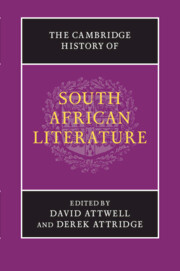Book contents
- Frontmatter
- Introduction
- PART I ORATURES, ORAL HISTORIES, ORIGINS
- PART II EXPLORATION, EARLY MODERNITY AND ENLIGHTENMENT AT THE CAPE, 1488–1820
- PART III EMPIRE, RESISTANCE AND NATIONAL BEGINNINGS, 1820–1910
- PART IV MODERNISM AND TRANSNATIONAL CULTURE, 1910–1948
- PART V APARTHEID AND ITS AFTERMATH, 1948 TO THE PRESENT
- 19 The fabulous fifties: short fiction in English
- 20 Writing in exile
- 21 Afrikaans literature, 1948–1976
- 22 Afrikaans literature after 1976: resistances and repositionings
- 23 The liberal tradition in fiction
- 24 Black Consciousness poetry: writing against apartheid
- 25 Popular forms and the United Democratic Front
- 26 Writing the prison
- 27 Theatre: regulation, resistance and recovery
- 28 The lyric poem during and after apartheid
- 29 Writing and publishing in African languages since 1948
- 30 Writing the interregnum: literature and the demise of apartheid
- 31 Rewriting the nation
- 32 Writing the city after apartheid
- PART VI SOUTH AFRICAN LITERATURE: CONTINUITIES AND CONTRASTS
- Index
- References
23 - The liberal tradition in fiction
from PART V - APARTHEID AND ITS AFTERMATH, 1948 TO THE PRESENT
Published online by Cambridge University Press: 28 January 2012
- Frontmatter
- Introduction
- PART I ORATURES, ORAL HISTORIES, ORIGINS
- PART II EXPLORATION, EARLY MODERNITY AND ENLIGHTENMENT AT THE CAPE, 1488–1820
- PART III EMPIRE, RESISTANCE AND NATIONAL BEGINNINGS, 1820–1910
- PART IV MODERNISM AND TRANSNATIONAL CULTURE, 1910–1948
- PART V APARTHEID AND ITS AFTERMATH, 1948 TO THE PRESENT
- 19 The fabulous fifties: short fiction in English
- 20 Writing in exile
- 21 Afrikaans literature, 1948–1976
- 22 Afrikaans literature after 1976: resistances and repositionings
- 23 The liberal tradition in fiction
- 24 Black Consciousness poetry: writing against apartheid
- 25 Popular forms and the United Democratic Front
- 26 Writing the prison
- 27 Theatre: regulation, resistance and recovery
- 28 The lyric poem during and after apartheid
- 29 Writing and publishing in African languages since 1948
- 30 Writing the interregnum: literature and the demise of apartheid
- 31 Rewriting the nation
- 32 Writing the city after apartheid
- PART VI SOUTH AFRICAN LITERATURE: CONTINUITIES AND CONTRASTS
- Index
- References
Summary
To speak of any ‘tradition’, let alone a ‘liberal’ tradition, in South African English fiction requires caution. In 1979 Stephen Gray considered that ‘tradition-making, in English South Africa, has often occurred fortuitously, rather than by any planned consciousness through which the writer has fused his or her own literature's past with contemporary stimuli’ (Southern African Literature, p. 7), and in 1994 Stephen Clingman concluded that there is ‘no aim or sense of building a novelistic tradition’, only ‘patterns of thematic accumulation’ (“Novel’, p. 1148). If the critical consensus has resisted the notion of a tradition, it has nevertheless ascribed a certain shape to the literary history of liberal fiction. Richard Rive, himself a liberal author, is one of many who consider Alan Paton's Cry, the Beloved Country (1948) a ‘watershed’, soon after which ‘liberal writing was on the wane’ (‘Liberal Tradition’, pp. 31, 21). Paul Rich argues that between Beloved Country and Nadine Gordimer's The Late Bourgeois World (1966) a ‘crisis at the heart of post-war South African liberalism’ gave rise to ‘a progressive loss of literary self-confidence’ that ‘produced an internal crisis of literary form’ (Hope and Despair, pp. 119–20; see also Rich, ‘Liberal Realism’), while Michael Vaughan describes the overturning of liberal hegemony in the 1970s by modernism and popular realism, represented respectively by J. M. Coetzee and Mtutuzeli Matshoba (“Literature and Politics’).
- Type
- Chapter
- Information
- The Cambridge History of South African Literature , pp. 474 - 499Publisher: Cambridge University PressPrint publication year: 2012
References
- 11
- Cited by



